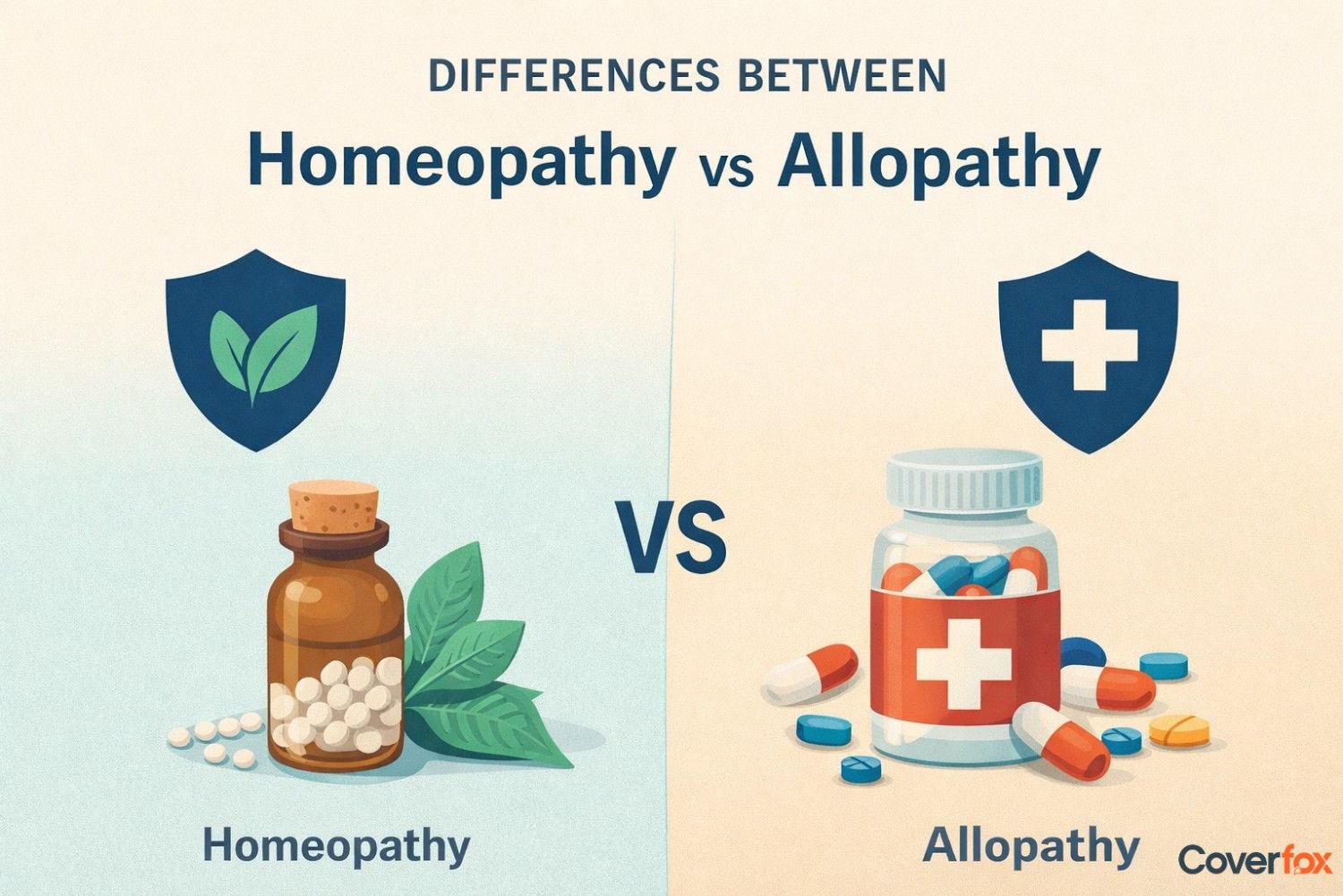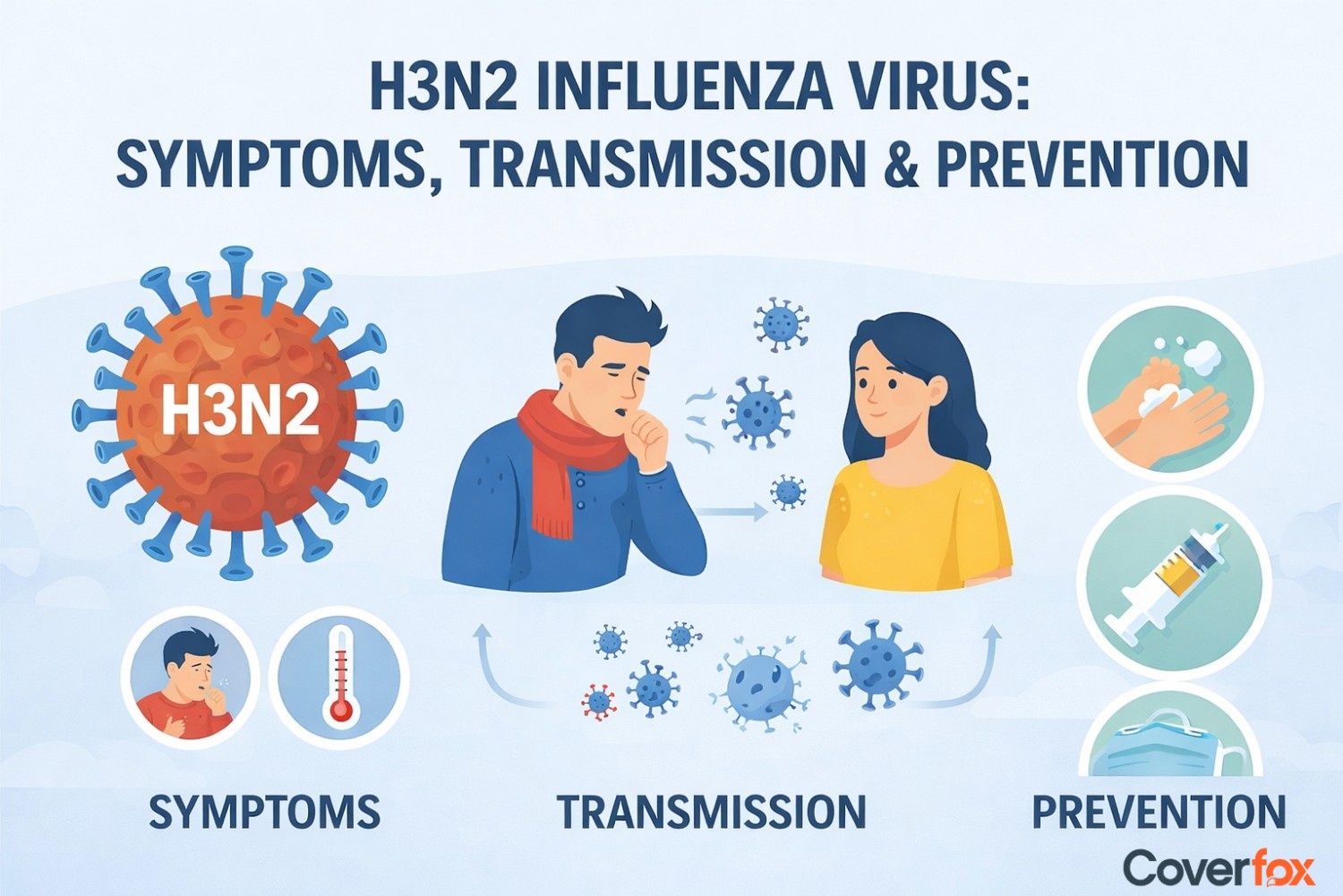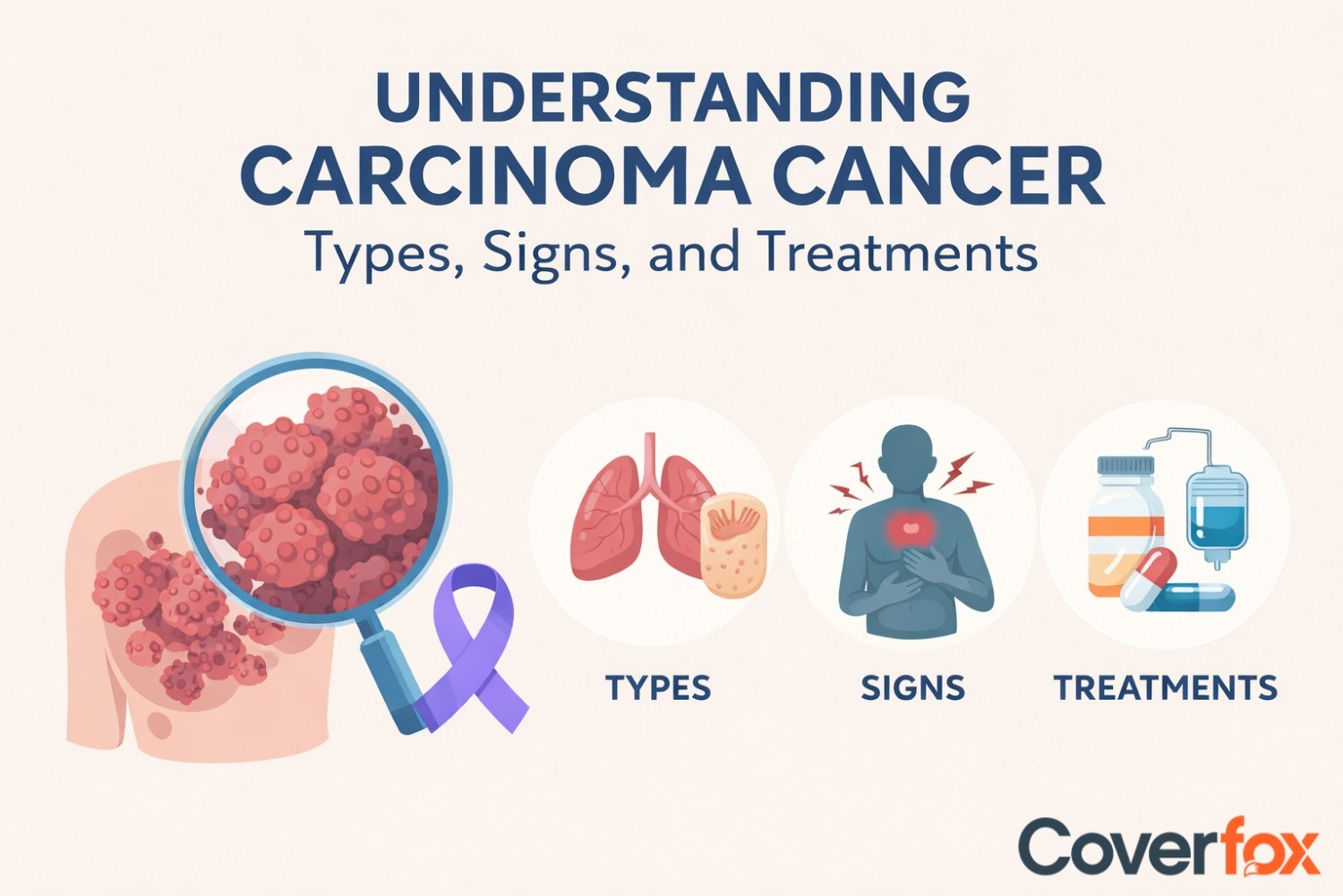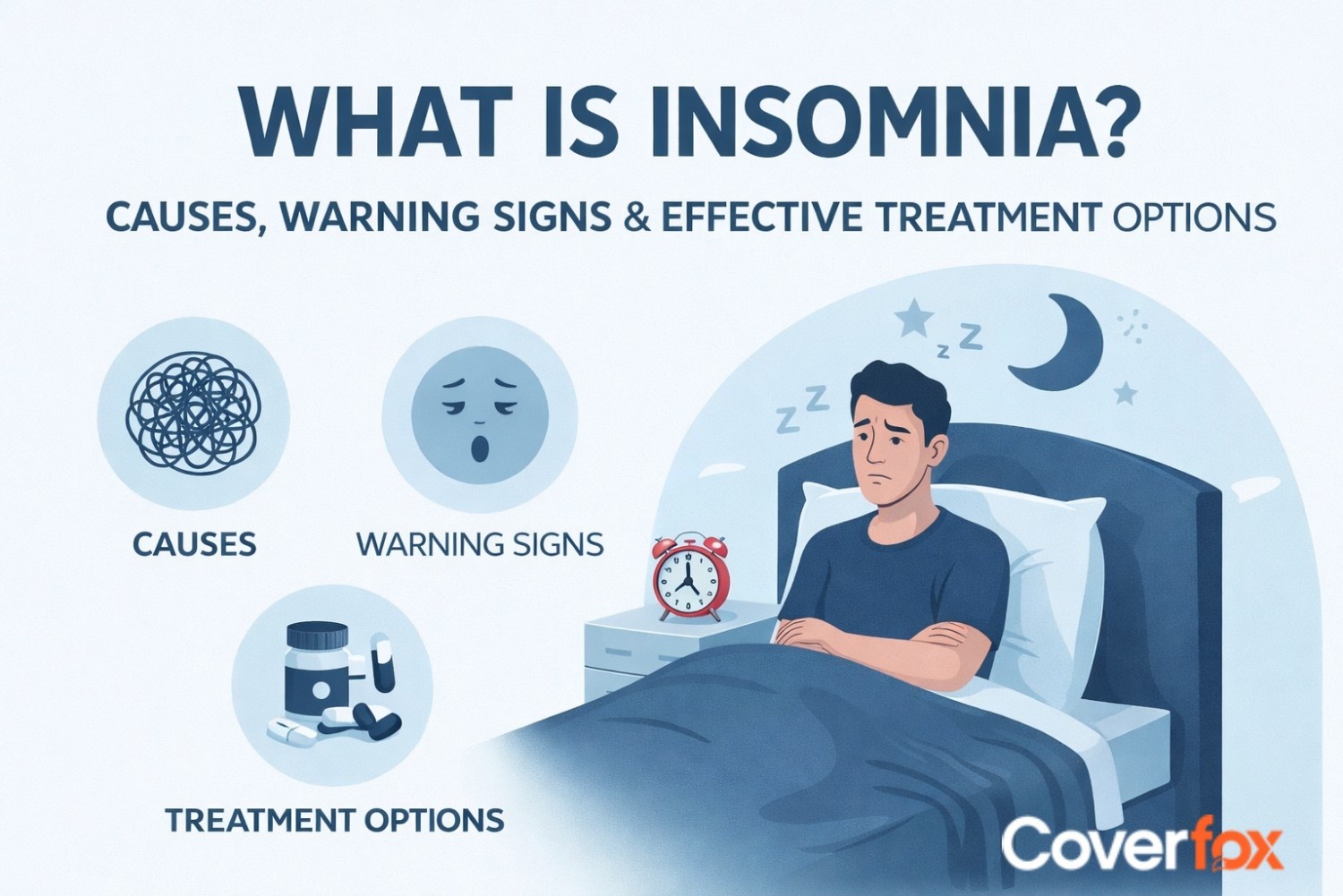As soon as the monsoon arrives, it lifts your spirits as it brings the most soothing wave of fresh air, nature’s scent, and a pleasant aroma. Along with this, it also poses some health hazards, for which you need to take precautions.
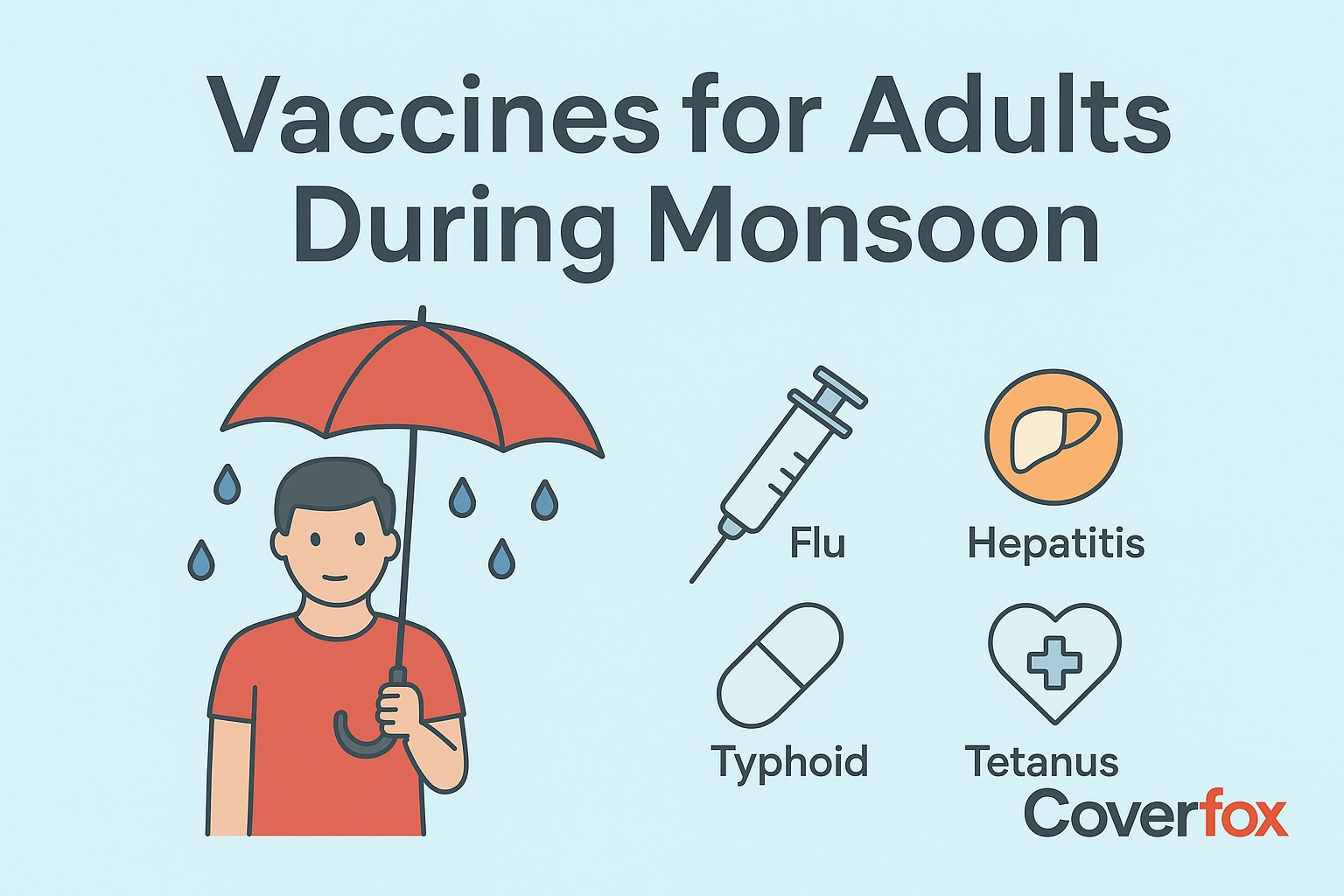
Infections quickly spread due to puddles, excess humidity and wet surroundings. Usually, adults already have pre-existing health problems, and the rain makes the situation worse by adding several diseases to the list. To overcome this, vaccination is required as it protects and strengthens their body to fight common monsoon illnesses. Adults need to stay updated with all the required vaccines, which help them prevent serious diseases and ensure their well-being. Along with vaccination, health insurance protects them financially and offers a safety net during medical emergencies.
Why Do Adults Need Monsoon-Specific Vaccinations?
Adults generally underestimate the importance of basic healthcare and believe vaccinations are essentially for children. But the rainy season brings some serious health risks like typhoid, malaria, pneumonia, etc, and adults are equally prone to infections that lead to intense complications. With growing age, changing lifestyle demands, and existing health problems, adult vaccination plays a vital role in safeguarding and staying protected during this sensitive season.
Neglect of Preventive Care
Pre-existing Health Conditions
Increased Work & Travel Exposure
Caregiving Responsibilities
Age-Related Decline in Immunity
Seasonal Outbreak Patterns
Grown-ups tend to prioritise treatments only after they fall sick once and overlook vaccines, which could prevent illness initially. This increases the chances of them falling sick and getting affected by seasonal infections.
People suffering from chronic diseases such as diabetes, hypertension, heart disease, or asthma tend to lower the body's ability to fight infections and increase the severity and duration of diseases during the monsoon.
Adults often keep travelling for work or other purposes and get exposed to crowded public transport, waterlogged areas or any other unhygienic places, which intensifies their risk of infectious germs, and they fall ill.
Adults caring for children, elderly parents, or sick family members are at higher risk of catching and spreading infections, making vaccination a responsible step for both self and their families.
With growing age, especially after 50, the body’s immune system weakens and makes it harder to fight infections and increases vulnerability to complications. As per a case study, growing age weakens their immune system and lowers the efficiency of the vaccine. During rains, higher humidity and pathogens increase seniors’ risk of getting infected with respiratory and gastrointestinal illnesses.
The monsoon brings a rise in waterborne, vector-borne, and respiratory diseases, and hence, timely vaccination helps to reduce the probability of being affected by these seasonal outbreaks.
Common Monsoon-Related Diseases Affecting Adults
Monsoon not only brings a perfect season for you to experience calm, but also creates an ideal surrounding for the circulation of various infectious diseases. Stagnant water, unhygienic areas, and humidity are the main causes for the rise in waterborne as well as vector-borne diseases. Here are the common monsoon-related diseases affecting adults:
Waterborne Diseases in Monsoon
Vector-Borne Diseases in Monsoon
Respiratory Infections
Gastrointestinal Infections
Skin & Fungal Infections
Waterborne diseases in monsoon like typhoid, cholera, and hepatitis spread through contaminated water and food, often caused by poor sanitation during heavy rains.
Mosquitoes breed rapidly in stagnant water and lead to vectorborne diseases in monsoon such as dengue, malaria, and chikungunya, which can cause severe complications if not treated on time.
High humidity and dampness increase the risk of influenza, viral fevers, bronchitis, and pneumonia, especially in adults with weak immunity.
Contaminated food and poor hygiene during monsoons often trigger diarrhoea, gastroenteritis, and food poisoning, leading to dehydration and weakness.
Excess moisture and continuous wetness make adults prone to athlete’s foot, ringworm, and other fungal infections during monsoon, causing irritation and discomfort.
Vaccines Recommended for Adults During Monsoon
The monsoon season significantly increases the risk of infections, many of which can be prevented or reduced in severity through timely vaccination. Adults, especially those with underlying health issues, frequent exposure to crowds, or age-related decline in immunity, should stay updated with essential vaccines to safeguard their health.
Typhoid Vaccine
Hepatitis A Vaccine
Influenza (Flu) Vaccine
Hepatitis B Vaccine
Tetanus, Diphtheria & Pertussis (Tdap) Booster
Pneumococcal Vaccine
Chickenpox / Shingles Vaccine
Typbar TCV, TYPHIBEV, Typhim VI are some of the vaccines available for typhoid, and it is better to take them before the monsoon season for optimum protection. It protects you against typhoid fever, which is a common waterborne disease that spreads through contaminated food and water.
This vaccine helps in preventing hepatitis A infection, a disease that spreads through unhygienic food and water and often causes liver complications. For long-term immunity, generally two doses of Havrix, Avaxim 160U and Hapibev are given.
This vaccine helps in reducing the risk of seasonal flu and respiratory infections that are more frequent during damp, humid weather. People can get vaccines like Fluarix Tetra, FluQuadri and Influvac Tetra to stay protected from the flu.
It is recommended for adults at risk of exposure, as it protects against chronic liver disease and complications. Usually, a 3-dose schedule (0,1,6 months) is given for proper cure, and vaccines like Engerix-B, BEVAC, Shanvac-B are used.
Boostrix and Adacel are the vaccines available for tetanus, diphtheria and pertussis. Every adult should get one Tdap, followed by boosters every 10 years. It helps strengthen immunity against these bacterial infections, especially important for adults who haven’t taken a booster in the last 10 years.
It is advised for adults over 50 or those with chronic conditions to prevent pneumonia and severe respiratory complications. Usually, doctors recommend taking PCV first and then followed by PPSV23 according to your age and medical condition. Other vaccines available for pneumonia are Pneumovax 23, Prevenar 13, and Prevenar 20.
Recommended for adults who have never had chickenpox or those over 50, to reduce the risk of shingles, which can be triggered due to lowered immunity. Varilrix and Varivax are vaccines available for chickenpox, while Shingrix and Zostavax are vaccines available for shingles. Shingles vaccination is highly recommended for people 50+ to prevent painful flare-ups and complications.
Precautions Before Vaccination During Monsoon
No doubt vaccines provide strong protection against seasonal diseases, but certain precautions must be taken before getting vaccinated, especially during the monsoon season when infections are already widespread. These steps ensure safety, effectiveness, and minimal side effects.
Check Overall Health Condition
Consult a Healthcare Provider
Review Past Vaccinations
Allergy Awareness
Medication Interactions
Hydration & Nutrition
Postpone if Recently Vaccinated
Avoid vaccination if you are already suffering from fever, severe cold, or any active infection. Wait until you recover for the best results.
Discuss your medical history, ongoing treatments, or chronic illnesses clearly with a doctor to confirm which vaccines are suitable for you.
Always keep track of your previous immunisations and booster doses to avoid unnecessary repetition of them.
Inform the healthcare provider if you have any known allergies to vaccine components, medications, or food items.
Certain medications, such as steroids or immunosuppressants, may reduce vaccine effectiveness. So, consult your doctor earlier if you are on such drugs.
Stay well-hydrated and eat light, nutritious food before vaccination so that it helps the body tolerate the vaccine better.
Always maintain the recommended gap between two vaccines to avoid overlapping side effects or reduced effectiveness.
Final Takeaways
Rain raises the threat for adults of getting infected with vector-borne, waterborne and respiratory diseases, and hence vaccination plays an essential role here. It helps adults prevent harmful infections. You need to stay updated with the necessary vaccinations that not only give strength and immunity but also reduce the severity of common seasonal diseases. During this vulnerable season, along with vaccination, you also need to adopt some healthy habits and have health insurance, which ensures all-around protection for you when in need.
Also Read: Importance of Having a Health Insurance During Rainy Season
Frequently Asked Questions
Why do adults need vaccines during the monsoon season?
Adults need vaccination during the monsoon as this damp weather increases the chances of spreading infections.
I got vaccinated as a child. Do I still need these vaccines as an adult?
Yes, you need vaccine boosters and additional doses as an adult because childhood immunity fades over time.
Are these vaccines safe for adults over 50 or with chronic illnesses?
Yes, most vaccines are older, adult-friendly, or suffering from serious diseases. But consult your doctor prior to any vaccination.
Can I take multiple vaccines at the same time during the monsoon?
Yes, some vaccines can be given at the same time, but to let them work effectively and minimise the side effects, proper gaps must be taken between two vaccines. Yet seek your doctor’s advice in advance.
Where can I get these adult vaccines, and are they expensive?
Generally, you can get them at hospitals, pharmacies or clinics, and its cost varies but is usually affordable.

Written by
Smit Shah
Smit is a skilled writer, passionate about storytelling. When he is AFK, he's either exploring What If scenarios in his head or has immersed himself in Esports.
.webp)
 in Insurance.webp)
